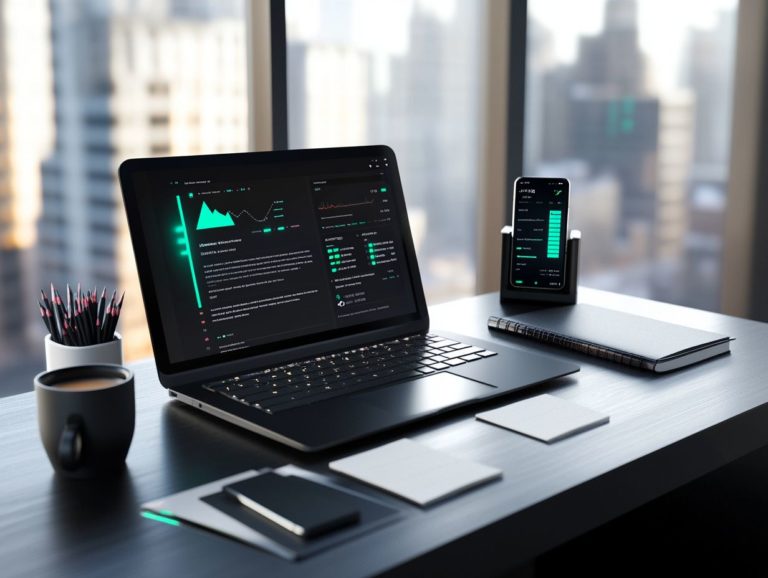5 Must-Know Tips for Effective Lead Follow-up
Let's Set Up Your Lead Generation Strategy
Fill out the form below, and our team will get in touch with you to create a tailored solution for your business.
In the fast-paced world of sales, effective lead follow-up can mean the difference between a lost opportunity and a successful conversion, especially when using a well-defined follow-up strategy.
This article delves into five essential strategies that will enhance your follow-up efforts. From the importance of swift responses to the art of personalizing your communication, you will learn how to truly understand customer needs.
You’ll uncover the significance of delivering real value, employing various channels, and diligently tracking your progress through effective communication. With valuable insights into common pitfalls and the impact of technology, this guide gives you the powerful tools you need to transform your lead follow-up process and significantly boost your conversion rates.
Jump in now and supercharge your sales game today!
Contents
- Key Takeaways:
- 1. Respond Quickly and Persistently
- 2. Personalize Your Communication
- 3. Provide Value and Solutions
- Let's Set Up Your Lead Generation Strategy
- 4. Utilize Multiple Channels of Communication
- 5. Track and Analyze Your Follow-up Efforts
- Why Is Effective Lead Follow-up Important?
- Let's Set Up Your Lead Generation Strategy
- Let's Set Up Your Lead Generation Strategy
- Frequently Asked Questions
- What are the 5 must-know tips for effective lead follow-up and follow-up schedule?
- Why is it important to set a prompt and organized follow-up schedule?
- How can personalizing communication improve lead follow-up?
- What are some effective channels to use for lead follow-up?
- Why is it crucial to respond quickly to leads?
- How can tracking and analyzing results improve lead follow-up?
Key Takeaways:

- Respond swiftly and consistently to leads to stay top of mind and build trust while using a strategic outreach approach.
- Personalize communication by addressing specific pain points and offering tailored solutions that meet the diverse needs of your sales leads.
- Provide value and solutions through informative and relevant content sharing to keep leads engaged and informed.
1. Respond Quickly and Persistently
In the competitive realm of sales, your ability to respond promptly and persistently to inquiries is essential for maximizing the effectiveness of lead follow-up. Particularly when dealing with leads that require immediate attention, a well-crafted follow-up strategy can nurture potential customers with finesse.
Research shows that timely responses can dramatically boost conversion rates and cultivate stronger customer relationships. Engaging potential customers through effective communication channels not only captures their attention but also builds trust, laying the groundwork for long-term loyalty.
Your outreach frequency is crucial. Staying top-of-mind increases the chances of closing sales significantly.
By implementing a system to manage customer relationships, you can streamline this process. It allows you to track interactions, set reminders, and respond promptly.
This level of organization fosters consistent communication, demonstrating your dedication to clients and ultimately enhancing the overall customer experience.
2. Personalize Your Communication
Personalizing your communication is essential for nurturing leads and improving initial contact strategies. By addressing customer needs directly, you enhance the effectiveness of your messaging, ensuring your outreach resonates with potential customers on a personal level.
When you take the time to understand individual pain points and preferences, you can craft messages that speak directly to your audience’s specific situations. This can be achieved through active listening, conducting surveys, and analyzing past interactions.
Identifying preferred contact methods—whether it’s through email, social media, or phone calls—plays a crucial role in making your communication feel more tailored and relevant. When leads feel understood and valued, they’re far more likely to engage, bolstering customer relationships and ultimately enhancing your conversion rates.
Personalized messaging fosters trust, making leads more inclined to take the next step in their journey.
3. Provide Value and Solutions
Providing value and solutions in your follow-up strategy is essential for nurturing leads effectively. This approach helps you distinguish between hot leads—interested customers—and cold leads—those who have shown little interest—ensuring that your communication delivers tangible benefits that address their specific pain points.
Let's Set Up Your Lead Generation Strategy
Fill out the form below, and our team will get in touch with you to create a tailored solution for your business.
To achieve this, you should adopt a value-based communication approach that focuses on understanding the unique needs of each lead. This involves utilizing blog posts and downloadable guides that offer insights and actionable solutions to common challenges.
By creating high-quality content that resonates with potential customers, you can establish authority in your industry and foster trust. Regularly sharing informative resources not only positions your brand as a helpful resource but also encourages ongoing engagement, prompting leads to view your brand as their go-to solution provider.
In this way, your communication becomes a bridge to building lasting relationships.
4. Utilize Multiple Channels of Communication

Utilizing multiple channels of communication is essential for elevating your follow-up methods. It allows you to connect with prospects through their preferred contact methods—be it email, social media, phone calls, or text messages.
This multi-channel approach not only diversifies your outreach but also cultivates stronger relationships by aligning with customer preferences. By systematically incorporating these contact methods into your follow-up strategy, you ensure your interactions remain relevant and timely.
For example, some customers might respond better to quick text alerts, while others may prefer the depth of detailed email newsletters. Understanding these nuances and adapting your approach accordingly significantly enhances your chances of converting leads into loyal customers, ultimately driving your sales growth.
5. Track and Analyze Your Follow-up Efforts
Tracking and analyzing your follow-up efforts is essential for refining your sales process. It allows you to assess lead scoring (this means ranking potential customers based on how likely they are to buy), optimize follow-up frequency, and adjust your schedule based on valuable data-driven insights.
A customer relationship management (CRM) system helps you capture detailed interactions with potential customers, providing a comprehensive overview of their engagement levels. This information gives you the power to identify patterns in responses, helping you determine when and how often prospects prefer to be contacted.
Analyzing these insights informs adjustments in timing and enhances your strategies for improving lead management. If the data reveals that a specific frequency yields the best engagement rates, the CRM’s analytics can guide your follow-up techniques, fostering a more personalized approach and significantly increasing the likelihood of conversion.
Why Is Effective Lead Follow-up Important?
Effective lead follow-up is crucial for driving successful sales outcomes. It directly influences your conversion rates and customer engagement, ultimately shaping the effectiveness of your follow-up strategy and the application of various sales techniques throughout the sales process.
Research shows that timely follow-ups can boost conversion rates by over 20%, emphasizing the importance of acting swiftly on potential leads. When prospects receive consistent communication, their likelihood of engaging with your offerings rises significantly—act now to seize that opportunity!
In fact, 70% of buyers expect a response within an hour of making an inquiry, yet many businesses struggle to meet this expectation. Missing these follow-ups can hurt your sales right away and also tarnish brand perception.
By implementing systematic follow-up methods, you can enhance engagement and build trust—both of which are essential for cultivating long-term customer relationships and achieving overall sales success.
What Are the Consequences of Poor Lead Follow-up and How to Avoid Them?
Poor lead follow-up can have dire consequences, resulting in missed opportunities and customer dissatisfaction. This ultimately hampers your nurturing process and skews sales statistics in a negative direction, highlighting the importance of a proactive approach.
Let's Set Up Your Lead Generation Strategy
Fill out the form below, and our team will get in touch with you to create a tailored solution for your business.
Imagine a potential customer reaches out about a product and is met with silence, leading to a missed initial contact opportunity. They’re likely to view your business as disinterested or unprofessional. This perception can lead not only to a lost sale but also to a tarnished reputation that impacts future leads.
Consider the scenario where a company consistently neglects warm leads; it’s almost guaranteed that competitors who engage more effectively through their outreach frequency will swoop in and seize those opportunities. This could result in a significant decline in potential revenue.
Over time, these missed connections can contribute to a decrease in market share and customer loyalty, underscoring the critical need for an efficient lead follow-up strategy.
How Can Effective Lead Follow-up Lead to Increased Conversions?

Effective lead follow-up can boost your conversions. It streamlines the steps in the conversion process and enhances customer engagement, especially with hot leads through smart outreach. It’s all about communicating value that resonates with their specific needs.
To truly unlock this potential, you must identify and prioritize your leads. Customize your approach by actively listening to their concerns and preferences. A robust follow-up strategy requires timely responses and personalized solutions, which help establish trust and showcase your genuine interest in addressing the customer’s unique challenges.
When customers feel understood and valued, they are much more likely to convert. Make ongoing communication your priority, adapting to their evolving needs through effective messaging. Clear, consistent messaging is crucial in creating a seamless experience, guiding customers toward decisions that feel right for them.
What Are Some Common Mistakes to Avoid in Lead Follow-up?
Common mistakes in lead follow-up can derail your outreach frequency and follow-up strategy, undermining your efforts. This results in ineffective communication that hampers relationship building and effective messaging with potential customers.
These pitfalls often arise from a lack of personalization; generic messages make it challenging for prospects to feel valued or understood. If your timing is off, leads may feel neglected, causing them to lose interest or explore alternatives. Avoid these errors to protect your long-term trust!
To navigate these challenges effectively, tailor your communication by leveraging insights from previous interactions to create relevance. By ensuring frequent yet thoughtful follow-ups, you keep potential customers engaged and signal their significance in your business’s growth and nurturing leads.
How Can Technology Help with Lead Follow-up?
Technology is critical in elevating your lead follow-up game through Customer Relationship Management (CRM) systems and automation. These tools empower your sales team to refine their outreach methods and leverage data analysis and sales statistics for knowledge-based decision making.
These tools automate tedious, repetitive tasks, ensuring that you maintain timely and consistent communication with potential clients. Features like ranking leads based on their engagement allow you to prioritize prospects, while integrated analytics offer valuable insights into customer behavior and audience understanding, enabling you to tailor your approach with precision.
Marketing automation tools can even send personalized follow-up emails at just the right moment, significantly boosting your chances of conversion. By embracing these cutting-edge technologies, your organization can better track interactions, assess results, and ultimately cultivate stronger relationships with your leads.
What Are Some Best Practices for Lead Follow-up?
Implementing best practices in lead follow-up is crucial for elevating your results and conversion rate. This includes maintaining an optimal follow-up frequency, employing effective communication techniques, and focusing on relationship building to nurture your leads throughout the sales funnel.
Prioritize consistency and follow-up frequency in your outreach, ensuring that each lead feels valued and never overlooked. Personalization is key; tailoring your messages to align with each lead’s specific interests and pain points can significantly boost engagement.
Let's Set Up Your Lead Generation Strategy
Fill out the form below, and our team will get in touch with you to create a tailored solution for your business.
Incorporating strategic outreach tactics and prospecting strategies—such as utilizing varied communication methods like email, phone calls, or social media—will help you connect with leads more effectively. Regularly review and adjust your follow-up strategies based on responses to keep your approach dynamic and engaging, ensuring it resonates with each lead and maximizes conversion potential.
Frequently Asked Questions

What are the 5 must-know tips for effective lead follow-up and follow-up schedule?
The 5 must-know tips for effective lead follow-up are:
1. Set a prompt and organized follow-up schedule.
2. Respond quickly and personalize your communication.
3. Use multiple channels to reach leads.
4. Track and analyze your results regularly.
Why is it important to set a prompt and organized follow-up schedule?
Setting this schedule helps you avoid missing potential leads. It keeps you consistent in your follow-up efforts.
How can personalizing communication improve lead follow-up?
Personalizing communication shows that you care about the lead’s needs. This increases the likelihood of engagement and conversion.
What are some effective channels to use for lead follow-up?
Effective channels include email, phone calls, social media messages, and personalized video messages.
Why is it crucial to respond quickly to leads?
Quick responses significantly increase your chances of converting leads into customers. They are more likely to engage and remember your brand.
How can tracking and analyzing results improve lead follow-up?
Tracking results helps you identify which tactics work best for conversion. This allows you to adjust your approach and enhance your follow-up techniques.






